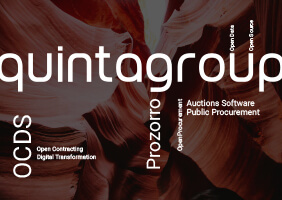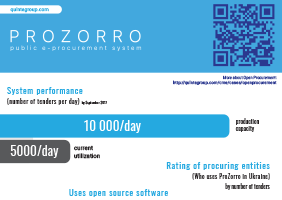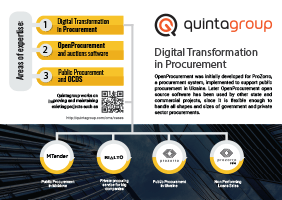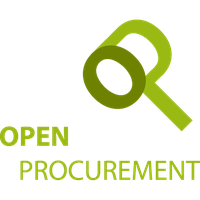 OpenProcurement is an open source e-procurement toolkit distributed under the Apache license.
OpenProcurement is an open source e-procurement toolkit distributed under the Apache license.
The main aim of this toolkit is providing the tools to design and build a procurement process that is transparent, effective, and competitive. The toolkit builds accessible processes that leverage auctions to drive savings and are backed by strong data collection and reporting. It is designed to be automated and scalable.
OpenProcurement was initially developed for ProZorro, a procurement system implemented to support public procurement in Ukraine. Later OpenProcurement has been used by other state and commercial projects, since it is flexible enough to handle all shapes and sizes of government and private sector procurements.
e-Procurement software can be beneficial for marketplaces / commercial platforms and add value to your business in the strategic procuring / purchasing projects:
- Procurement / sale / purchasing processes are automated and scaled.
- Supplier base and market shares are increased.
- Procurement / purchasing workflow are defined and enforced.
- Input data, procedures and organization are standardized.
- Diversity of procedures and approaches (multiple lots, non-price criteria, complaint resolution, etc.)
- Reliable procedures supported by automated test stand.
- Auditing and event tracking via log server.
OpenProcurement architecture
The basic toolkit, that comprises storing data and conducting auctions, is free. The toolkit's Data Standard was developed on the basis of Open Contracting 1.0RC. These data standards were extended to ensure practical implementation of the procurement process in the Prozorro system.
OpenProcurement contains a Central database (CDB) and an API (REST-ful interface based on the JSON notation) via which specialized commercial web platforms can interact with CDB. Web platforms implement e-Procurement system features and provide access for organizators, participants and regular visitors. Web platforms interact with the CDB via OpenProcurement API and provide suppliers with temporary credentials to access the Auction module for participation in the auction.
Once a procurement is announced and bid proposals are registered, users get access to the 3-round auction. Reverse auctions enable competitive bidding environment, while the 3-round design ensures auctions are not overly long to discourage participation.
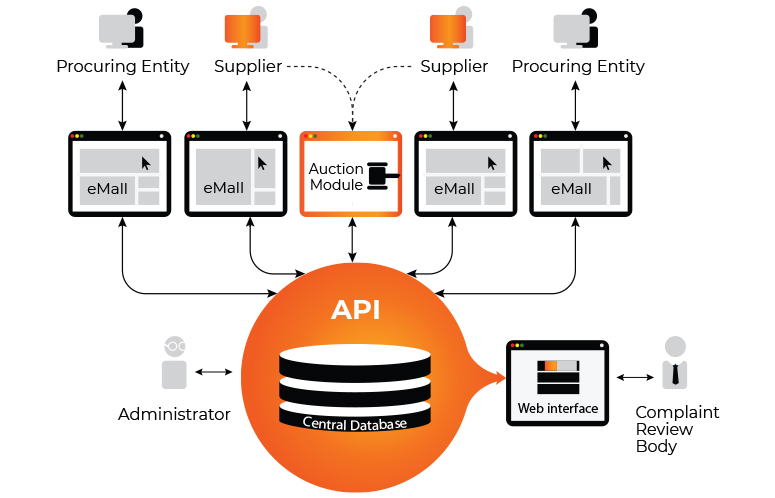
What technologies are used here?
The technical specifications of OpenProcurement are intended to provide a functional solution that will be flexible enough to work with different standards and varied applications. The toolkit was developed with Python, Pyramid, Angular.js, Bootstrap, Flask, CouchDB, PouchDB and other powerful open source web technologies to ensure reliable functionality and secure workflow.
Can this solution be used for public procurements?
The Open Procurement toolkit was designed specifically for the procurement of goods and services on behalf of public authorities. Public procurement has specific requirements to the accessibility and transparency of procedures. This solution enforces (where appropriate) and encourages recognised best practices during the whole tendering process. The Open Procurement toolkit uses electronic documents, strict qualification requirements, transparent system of proposals evaluation and awarding, effective reverse auction and open access to the procurement data.
Can I use OpenProcurement for commercial solutions?
Yes, free OpenProcurement software can be used for development of custom commercial solution and even its sale. Parts of the OpenProcurement toolkit (e.g. Central database or Auction module) can be used together or separately for any commercial projects.
Has this toolkit been applied anywhere?
Yes, it was used in several different projects. Read more about OpeProcurement toolkit implementation for ProZorro, ProZorro.sale, and Rialto projects.
Does the database store information about users, such as their logins/passwords?
The Central Database does not store any authorization data about registered users. The Central Database stores all documents, data, and other information related to the organization and conduction of procurement. Authorization data is an identificational data of system users that allows them to participate in the procurement processes or their appeal, so it is very important to keep it secret. The web platform/operator is responsible for protection against unauthorized access and accidental destruction and/or distortion of account data contained in the system.
If my web platforms is written in X programming language, can it work with this toolkit?
The Open Procurement toolkit was designed with the flexibility in mind. Regardless the programming language or any other technology specifications any web platform can seamlessly interoperate with the Central Database via an API. The API is part of the toolkit so that web platform can provide suppliers with temporary credentials to access the Auction module for participation in the auction.
Where can I host the Central Database and the Auction module?
These parts of the toolkit can be hosted using cloud service like Amazon. One of the requirements is S3-compatible document repository, for example, Apache Swift.
Are there any restrictions of database size or amount of procurements?
The toolkit was developed to avoid imposing restrictions on the size of database and/or number of conducted procurements.

